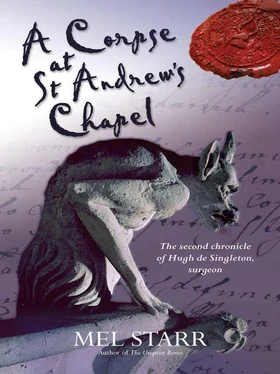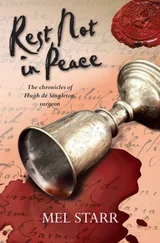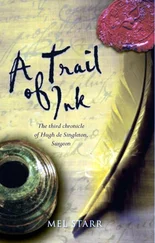Mel Starr - A Corpse at St Andrew's Chapel
Здесь есть возможность читать онлайн «Mel Starr - A Corpse at St Andrew's Chapel» весь текст электронной книги совершенно бесплатно (целиком полную версию без сокращений). В некоторых случаях можно слушать аудио, скачать через торрент в формате fb2 и присутствует краткое содержание. Год выпуска: 2010, Издательство: Kregel Publications, Жанр: Исторический детектив, на английском языке. Описание произведения, (предисловие) а так же отзывы посетителей доступны на портале библиотеки ЛибКат.
- Название:A Corpse at St Andrew's Chapel
- Автор:
- Издательство:Kregel Publications
- Жанр:
- Год:2010
- ISBN:нет данных
- Рейтинг книги:5 / 5. Голосов: 1
-
Избранное:Добавить в избранное
- Отзывы:
-
Ваша оценка:
- 100
- 1
- 2
- 3
- 4
- 5
A Corpse at St Andrew's Chapel: краткое содержание, описание и аннотация
Предлагаем к чтению аннотацию, описание, краткое содержание или предисловие (зависит от того, что написал сам автор книги «A Corpse at St Andrew's Chapel»). Если вы не нашли необходимую информацию о книге — напишите в комментариях, мы постараемся отыскать её.
A Corpse at St Andrew's Chapel — читать онлайн бесплатно полную книгу (весь текст) целиком
Ниже представлен текст книги, разбитый по страницам. Система сохранения места последней прочитанной страницы, позволяет с удобством читать онлайн бесплатно книгу «A Corpse at St Andrew's Chapel», без необходимости каждый раз заново искать на чём Вы остановились. Поставьте закладку, и сможете в любой момент перейти на страницу, на которой закончили чтение.
Интервал:
Закладка:
When the door latched behind us John continued his tale. “I seen somethin’ light in the moonlight. Was well past midnight an’ the moon is past last quarter, but I seen the sack you said t’watch for. ’Course I din’t know then ’twas a sack. Just saw somethin’ movin’.”
“In the Weald, you say?”
“Aye. But while I watched whoso was carryin’ the sack moved across the meadow an’ into Lord Gilbert’s wood.”
“They avoided the road?”
“Aye, they did.”
That might explain why I saw no man while I lay in wait all night at the edge of the wood. If this poacher had ventured to do more of his work that night, and if he avoided the road, he would have entered the forest south of where I sat in wait on the stump.
“Can you show me the place where you saw the fellow enter the forest?”
“Close, like…’twas too dark to see for sure.”
“What then? Did the fellow eventually come out to the road?”
“Nay. Least, not so far as I could tell. I went west on Mill Street’s far as the wood. Saw nor heard nothin’. Dark in the wood, nights, now w’the leaves full out an’ all.”
“You do not know who it was who cut ’cross the meadow and made for the forest?”
“Nay.”
“And that is why you are so apprehensive to tell me of this?”
“Aye. Was the fellow to see us or hear me speak, he might think I knew of him an’ his business.”
“And one beadle is dead these past three months for probing some nocturnal matter.”
“Eh?”
“At night…Alan died at night.”
“Oh, aye.”
“Well, I do not blame you for your worry. I will look into the matter myself. How far south of Mill Street did the man enter the wood?”
The beadle scratched his head and looked to the ceiling beams before he spoke. “More’n a hundred paces…perhaps even 200, but no more’n that.”
“Very well. Be off home, then. I will wait ’til afternoon to visit the wood, so if any man saw us in conversation he will have lost interest when I do not immediately seek a sign in meadow or wood.”
Chapter 14
The sun was dropping toward the treetops to the west of the castle when I decided I must wait no longer to investigate the beadle’s discovery. I had found much other business to occupy me after dinner. When I consider this now I understand that it was fear of being knocked again on the head which caused me to hesitate, not any desire for stealth. Had you received the blow I took at Alvescot Church, you would be cautious also.
My eyes fell upon the ash pole which had been dropped against my skull as I left my chamber. I had propped it in a corner after it fell against me. Perhaps the staff might this time serve to defend me and so make amends for its previous usage. I took the cudgel with me and set out for the gatehouse.
I watched carefully, when I reached Mill Street, to see if any man observed me set off to the west toward the wood. Two men walked from the mill and turned east to cross Shill Brook. They paid me no heed. In the Weald I saw Emma atte Bridge at work in her toft. If she saw me she gave no sign.
Reassured that I attracted no attention, I strode west and soon entered Lord Gilbert’s forest. I counted 200 paces, then turned from the road. The forest here had not been coppiced for many years. Giant old oak and beech trees sought the sky. They would be worth a small fortune for long beams, did anyone want to build. But since the plague, few did. Their leafy branches so completely blocked the sun that few green things grew on the forest floor. No hawthorn or nettles impeded my way as I counted another hundred paces to the south.
I stopped often while I counted my steps. If a poacher set snares this way I might hear a captured animal as it struggled to free itself. And if I was observed and followed, I might hear a stalker as leaves rustled and twigs snapped under his feet. No, I was not being over cautious. There really was a man who intended me harm. The shrinking lump on my head was proof of that.
A goldfinch twittered in the branches above me. A squirrel dug through rotting leaves for his supper. The breeze set leaves to shimmering and branches to rubbing against each other. I saw the sights and heard the sounds of the forest. And so delightful were they, I came near to forgetting my mission. It would be a poorer world were there no goldfinches singing or squirrels playing in it. In my prayers I do not recall ever thanking God for either birds or squirrels. I must amend my ways and my prayers.
When I had counted 100 paces from the Alvescot road I leaned against an oak to listen and observe my place. I might have been the only man in the shire, for no sound made by man came to my ears. And no sight foreign to a forest fell to my eyes.
I crept another ten paces, found another tree to hide me, and again watched and listened. Nothing, but for birds and the occasional squirrel. Did a man wish to set snares for squirrels, which is allowed, he should surely find success. Although I thought it unlikely such a hunter would require a sack across his shoulder to carry home his prize.
The ground I walked sloped gently down from the road. Each step took me closer to a tangle of ivy and marsh grass which grew about a bog where the forest ended. No man would try to push his way through such a place. The verge of such a marsh would be an excellent place to lay a snare. I became more cautious and observant as I approached this boggy place.
I found no snares, but the track of a man’s passing was visible to an alert observer. There had been no rain for several days, so last year’s fallen leaves should be dry atop the forest floor. But where the firm ground of the forest began to give way to the soft muck of the marsh I found a place where wet, rotting leaves had been kicked up above the drying surface leaves.
A few steps to the west I found another such place. These overturned bunches of leaves did not create a regular track, but were intermittent. It appeared that some man had stumbled or otherwise tripped while making his way through the forest. The fellow must have been unsteady on his feet. Or perhaps he traveled at night across the uneven ground.
The broken trail of disturbed leaves crossed my path. I thought I knew, should I turn to my left, where the track would enter the forest. I walked that way to assure myself of my supposition. My guess was correct. Nearly 200 paces east of the bog the trail of disturbed leaves ended at a hedgerow to the west of a pasture. The road to Alvescot formed the north boundary of this meadow. Across it to the northeast I saw the castle.
The stacked stones of the meadow wall were overgrown with nettles and hawthorne. I saw clearly where someone had torn nettles away from the wall so he might climb over without earning a stinging rebuke.
The field before me was fallow this year. A flock of sheep munched the grass midway across the clearing, turning grass into wool and manuring the ground for the wheat and barley strips John Holcutt would see planted there next year.
Across the meadow another hedgerow formed its eastern margin. I saw near this wall the remains of the blind where the reeve, the archers and I had looked on this meadow for the return of a wolf. Beyond this far hedgerow lay the huts of the bishop’s men in the Weald.
While I studied the wall, nettles, meadow and sheep, another studied me. I looked up from examining the torn nettles and saw, 200 paces and more to the east, Emma atte Bridge staring over the far hedgerow in my direction from her toft. The hedgerow before me was waist high. Unless her vision failed she could identify me as clearly as I could her. I did not think this important at the time.
The woman went back to her work and I turned from the hedgerow to retrace my steps and follow the trail I had discovered. The occasional patches of disturbed leaves compassed the swamp around its north edge, then, to the west of the low ground it entered again into the higher ground of the forest.
Читать дальшеИнтервал:
Закладка:
Похожие книги на «A Corpse at St Andrew's Chapel»
Представляем Вашему вниманию похожие книги на «A Corpse at St Andrew's Chapel» списком для выбора. Мы отобрали схожую по названию и смыслу литературу в надежде предоставить читателям больше вариантов отыскать новые, интересные, ещё непрочитанные произведения.
Обсуждение, отзывы о книге «A Corpse at St Andrew's Chapel» и просто собственные мнения читателей. Оставьте ваши комментарии, напишите, что Вы думаете о произведении, его смысле или главных героях. Укажите что конкретно понравилось, а что нет, и почему Вы так считаете.












